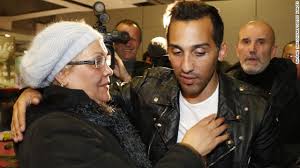By Andrew Warshaw
November 29 – Zahir Belounis, the French-Algerian footballer who has returned home after finally securing his exit permit to leave Qatar courtesy of a wave of international support, says he has nothing against the country itself but everything against the club that hired him.
Belounis, who had been embroiled in a pay dispute with his club Al-Jaish, was greeted at Charles de Gaulle airport in Paris by friends and family after arriving with his wife and two daughters aboard a Qatar Airways flight.
“This is not finished,” said Belounis, who went to court to claim 18 months’ worth of unpaid wages in a case taken up both by human rights organisations and the French government.
Shortly after touching down in Paris, Belounis, who is expected to hold a press conference early next week, told waiting reporters that he was “blackmailed” by Al-Jaish after launching his legal action.
“It is important to say that I have no problem with Qatar. My problem is with the club.”
Belounis finally obtained his exit visa, controlled by employers in the Gulf state under its controversial ‘kafala’ sponsorship system, on Wednesday.
Belounis, 33, initially moved to Qatar in 2007 and was even granted Qatari citizenship, enabling him to represent the country in the World Military Cup. In 2010, he signed a five-year contract to play with Al Jaish but launched a lawsuit in February this year because of unpaid wages. He claims his sponsor would not allow him to leave the country until he dropped the case.
The Qatar Football Association denies the claims but Insideworldfootball has been told by those close to Belounis that he was owed around €150,000. In mid-October, Belounis, who had been on medication for depression, was told he would be allowed home and sold off all his furniture, only to see the exit permit delayed, causing the intervention of a string an international human rights organisations.
According to the local Doha News website, the resolution of Belounis’ case came roughly a month after another French citizen, Stéphane Morello, was finally granted his exit visa too.
A football trainer, he reportedly came to Qatar in 2007 to work for the country’s Olympic committee, which hired him out to local teams. Problems apparently arose in 2009 while he was working for the Al-Shamal sports club, which wanted to change coaches and terminated his contract but refused to pay the money owed to him. He resigned in 2010 but could not get out until his sponsorship was transferred to the French embassy.
France’s ambassador to Qatar, Jean-Christophe Peaucelle, said that Belounis’ exit permit was the result of “intensive work between the French embassy and Qatari authorities”.
Among those who met Belounis at the airport was Abdeslam Ouaddou, another player who found himself in a dispute with a Qatari club and who has taken his case to FIFA.
“I am so happy for Zahir to come home but the real victory will be when the kafala system ends,” said Ouaddou, a Moroccan who played for several French clubs and Fulham in England before moving to Qatar in 2010.
“If they don’t change kafala then they should change where the World Cup is,” Ouaddou told CNN.
The Belounis case prompted the International Trade Union Confederation (ITUC) to demand a change to workers’ rights in Qatar.
ITUC general secretary Sharan Burrow said in a statement that the case has “come to illustrate the conditions faced by 1.3 million migrant workers in Qatar.”
“The torment that Zahir and his family have been put through because of bad laws which give workers no rights should never be repeated,” she said. “Sadly, today in Qatar there remain many workers who have no voice.”
Contact the writer of this story at moc.l1734873771labto1734873771ofdlr1734873771owedi1734873771sni@w1734873771ahsra1734873771w.wer1734873771dna1734873771

